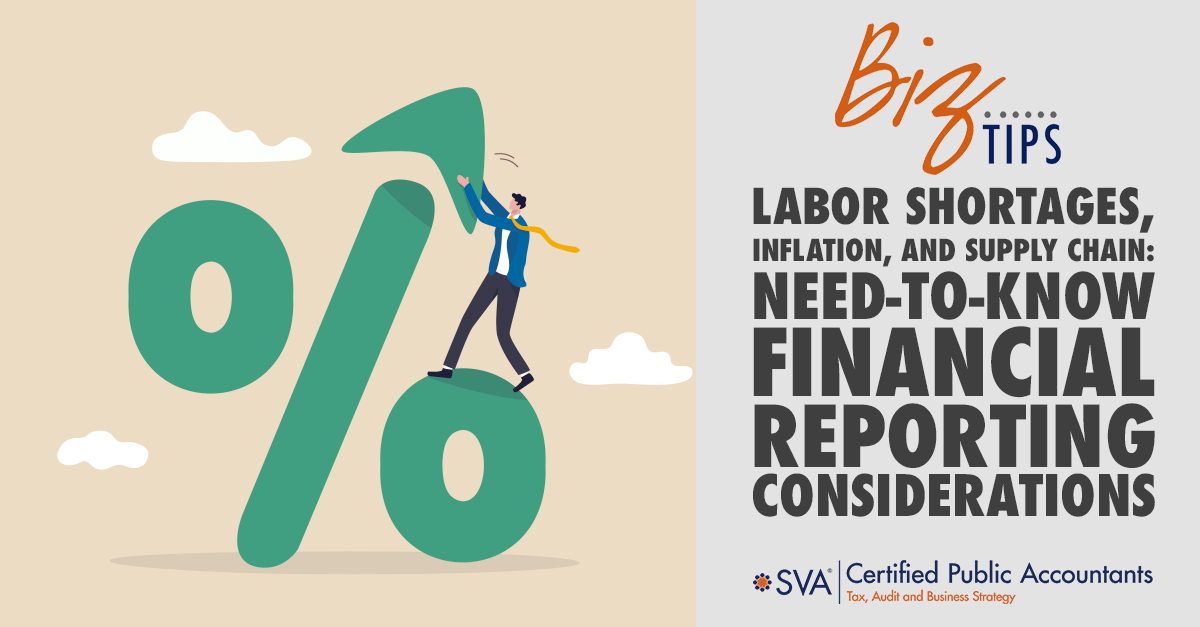The COVID-19 pandemic has created a whole host of problems extending far beyond the healthcare sector. Many disruptions have had a profound financial impact on both individuals and companies. Personal losses and business losses are often tied together.
In this situation, they have resulted in labor shortages, supply chain disruption, and significant inflation.
Labor Shortages
Individuals are realizing that their 9-to-5 jobs are not a good option for them. Some are retiring early or leaving the workforce to start their own businesses. This “Great Resignation” has had a huge impact on the supply chain, which has created a negative domino effect on many areas.
In April 2021, statistics indicated that four million workers quit their jobs. Those four million people represented 2.7% of the workforce, the highest number on record at the time. This number also does not consider the total number of separations, which includes layoffs and discharges — that number was 5.8 million in April 2021.
The April 2021 record was broken again in November when 4.5 million people quit their jobs. By February 2022, total separations were 6.1 million during that month, and the “quits” rate was 4.4 million or 2.9% percent.
Many theories have developed about why the “Great Resignation” has occurred, but Anthony Klotz, a U.S. academic who coined the phrase, believes it really boils down to four reasons.
- Pent-Up Resignations: People were afraid to leave their jobs during the first year of the pandemic. They were facing financial uncertainty, and many people who otherwise would have left their job in 2020 stayed a bit longer to curb some of the financial risks of switching jobs during the height of the pandemic.
- Burnout: Many workers quit or made a switch simply because they were burnt out. That burnout could have been smoldering for some time, or it could have been because of the increased demand necessary to cover other workers who had to take off because of COVID-19.
- “Terror Management Theory”: Psychologists believe that many people who are confronted with death or the threat of serious illness or harm start thinking about their lives differently. They consider what really makes them happy and make changes to increase their overall contentment. This theory is essentially based on the thinking that “life is short” and workers do not want to spend their time stuck in a job they really do not like.
- Autonomy: Many workers were forced to work from home during the height of the pandemic. Some really liked the freedom of working without a boss hovering over them. When workers were asked to come back to the office, they looked for other jobs that would offer them some flexibility to work from home regularly.
Klotz believes that resignation rates will continue to be high for the next two or three years. With all of the changes that workers are seeing around them, they might be building up to make a change themselves. As people continue to “sort out their lives” because of the effects of COVID-19, labor concerns are expected to continue.
Companies trying to keep their current labor force or attract new workers might need to make some significant changes. Higher wages, bonuses, and unique benefits are all ways that employers can help curb resignations.
Companies should also consider the potential accounting implications of these increased costs. Perhaps it will make more sense for some businesses to contract bonuses or other increases over time, deferring the actual cost on the books rather than incurring those costs immediately.
Inflation
COVID-19 had already put the country in a somewhat unstable financial position. The war involving Russia and Ukraine appears to have only made matters worse. February 2022 saw inflation rates at 7.9%, rising at the fastest pace in decades. Experts predict that inflation will worsen before it drops to normal levels.
Inflation is expected to increase costs for business owners virtually across the board. Freight and general administrative costs are likely to rise as well. Ultimately, companies have to increase prices to keep up with the increased costs of running their businesses if they want to maintain revenue at the current levels.
Companies may want to consider changes to cost structures to adapt. Investments might also significantly impact financial reporting because of inflation, so changes in this area might be appropriate.
(Download Video Transcript)
Companies should also keep in mind that inflation affects pension liability. When the discount rate increases, the recorded pension liability decreases. While this may seem helpful, companies might need to factor in an additional liability to adjust for the actual pension obligation in the future.
Supply Chain Disruptions
Moving goods through the supply chain has become more expensive because of significant supply chain disruptions. This increased cost affects the cost of inventory, cost of sales, and even a company’s overall profitability. As the cost of inventory rises, price increases may be necessary to keep up with expenses.
Having a specific cut-off procedure during the supply chain will help companies realize their complete revenue—which can help deal with some of the challenges that supply chain disruptions are forcing on a company’s books.
Appropriate financial reporting of finished goods requires considerations about timing:
- When does the buyer assume ownership of the goods?
- When does the company assume ownership of the raw materials to create the products?
- When is it appropriate to “cut off” ownership throughout the supply chain?
With the current challenges facing businesses, having the right financial reporting help is more important than ever.

© 2022 CPA ContentPlus

